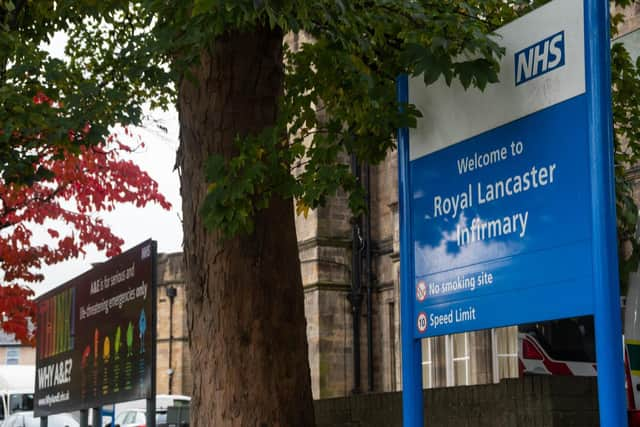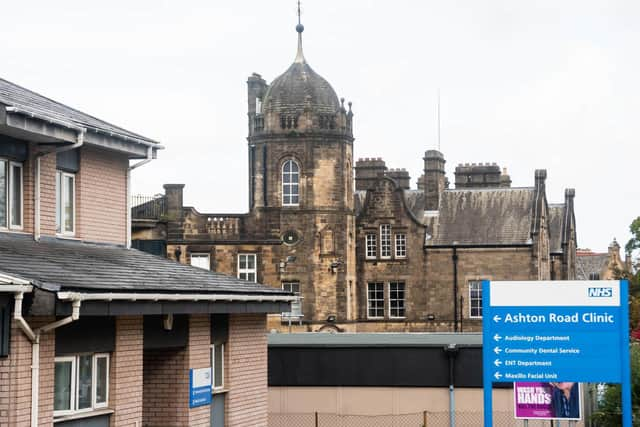Waiting times for routine treatment at Morecambe Bay hospitals hit record high
and live on Freeview channel 276
The King's Fund think tank says there is a “mountain to climb” to tackle delays caused by Covid-19, after NHS data showed more than 100,000 people across England had been waiting at least a year for non-urgent care – the most for more than a decade.
University Hospitals of Morecambe Bay NHS Trust (UHMBT) apologised to anyone who has had to wait longer, and said it is now seeing more routine patients.
Advertisement
Hide AdAdvertisement
Hide AdNHS statistics show 872 patients had been on the waiting list for 52 weeks or more for elective operations or treatment at UHMBT - which runs the Royal Lancaster Infirmary, Furness General Hospital, and Westmorland General Hospital - at the end of August.


This was the highest figure for the month since comparable local records began in 2011 – the previous August, just seven patients had been delayed as long.
According to NHS rules, patients referred for non-urgent consultant-led elective care should start treatment within 18 weeks.
Across England, the number of people waiting a year or more hit 111,000, a near tenfold increase from 1,236 in August 2019 and the highest figure since 2008.
Advertisement
Hide AdAdvertisement
Hide AdSiva Anandaciva, chief analyst at The King’s Fund, said: “NHS staff are working hard to restore services and find innovative new ways to care for patients, but as these figures show, there is a mountain to climb before waits for routine NHS care return to pre-pandemic levels.


“It now seems unlikely that the highly ambitious targets set for the recovery of NHS performance over autumn will be met, and it is important to be honest with patients and the public about how long people are likely to have to wait for care.”
A combination of the huge treatment backlog, rising Covid-19 hospital admissions, an expected winter surge in demand on services and exhausted and overstretched staff means NHS leaders are “braced for a torrid winter”, he added.
“Much will therefore depend on whether the Government can deliver increased capacity and improvements to the testing system to enable NHS and social care staff to be regularly tested for Covid.”
Advertisement
Hide AdAdvertisement
Hide AdOf the 24,661 patients waiting for treatment at UHMBT at the end of August, 52 per cent had been doing so for more than the 18-week window.


Kate Maynard, Chief Operating Officer UHMBT said: "We apologise to all those patients who have had to wait longer for their treatment.
"We don't want people to have to wait any longer than necessary but in order to manage the medical patients with symptoms of coronavirus during late March, April and into the summer, in common with the rest of the NHS we significantly reduced the number of routine appointments we offered.
"We have worked hard on our plans to restore our services and are seeing more routine patients both in our outpatients and for procedures and operations.
Advertisement
Hide AdAdvertisement
Hide Ad"However we will need to continue to balance this work with our duty to keep people safe whilst in our care and treat those who need emergency treatment as we continue to manage the seasonal pressures we currently face.
"We ask all the public to continue to help protect themselves, their loved ones and the NHS by washing their hands more often, covering their face where required and ensuring they give other people space - two metres is best."
NHS trusts are expected to make sure no more than eight per cent of patients are left waiting beyond the 18-week maximum target.
Nationally, 46 per cent of the 4.2 million people waiting at the end of the month had overshot the target time, although this an improvement on 53 per cent in July.
Advertisement
Hide AdAdvertisement
Hide AdAn NHS spokesman said: “Hospitals are carrying out more than a million routine appointments and operations per week, with around three times the levels of elective patients admitted to hospital than in April, as they continue to make progress on getting services back to pre-Covid levels including scanning services which are delivering millions of urgent checks and tests.
“It is obviously vital for patients that this progress continues, and isn't jeopardised by a second wave of Covid infections spiralling out of control."
Comment Guidelines
National World encourages reader discussion on our stories. User feedback, insights and back-and-forth exchanges add a rich layer of context to reporting. Please review our Community Guidelines before commenting.